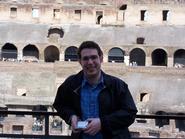
Texts like the Iliad may be old, but they are called classics precisely because they are timeless, turning up over and over again – sometimes in unusual places. Christopher Bouton '09, a rising senior from Beverly, Mass., is spending the summer researching the connections between Homer's Iliad and Odyssey, Virgil's Aeneid, and two slightly more recent productions: "Blade Runner" by Ridley Scott and the television series "Battlestar Galactica" by Ronald Moore.
Bouton is collaborating with Winslow Professor of Classics Carl. A. Rubino on the project, which is funded by the Emerson Foundation Grant program. Created in 1997, the program was designed to provide students with significant opportunities to work collaboratively with faculty members, researching an area of interest. The students will make public presentations of their research throughout the academic year.
A history major with a minor in classics, Bouton is no stranger to research. Last summer, he won a fellowship from the Society of Historians of the Early American Republic, which enabled him to attend an intensive three week program along with nine students from other colleges. Bouton worked with professors to examine school integration in Nantucket in the 1840s, a project that will be the basis of his senior thesis.
This summer the work is slightly different, however. Bouton has already studied modern ties to the Iliad, the Odyssey and the Aeneid in Rubino's "Heroism, Ancient and Modern" course, and he says that studying "Blade Runner" and "Battlestar Galactica" is very different kind of research from his work about Nantucket schools. "Listening to dialogue and watching action is much more engaging than looking at microfilm," he comments. At the same time, doing research on popular media brings its own challenges, one of which is making sure that the research is relevant to others. Bouton says he was drawn to studying "Blade Runner" and "Battlestar Galactica" because of his own interest in the productions, but to pursue a research project, it was important to have a broader underlying motivation than mere fandom.
That foundation lies in thematic connections on issues such as the nature of humanity and heroism. In the classics, explains Bouton, the characters are set apart from normal humanity, the "universal us," and the figures of the Iliad seem to be superhuman. "We get the sense that this is a story, but this isn't us," he says. In the dystopian future of "Blade Runner" and the world of "Battlestar Galactica," those same questions resurface, since each production features a small population of isolated humans in surroundings dominated by human-seeming robots. The classical themes turn into a discussion of what makes humanity unique when it can be simulated almost exactly by machines.
Now beginning the writing phase of his project, Bouton says that it has allowed him to extend his knowledge of the classics, something that he will not be able to pursue after leaving Hamilton, since he plans to attend graduate school and earn a Ph.D. in history. The chance to follow diverse interests is one of the reasons he came to Hamilton, he says, and his research this summer has been an opportunity to do just that.
-- by Laura Bramley
Bouton is collaborating with Winslow Professor of Classics Carl. A. Rubino on the project, which is funded by the Emerson Foundation Grant program. Created in 1997, the program was designed to provide students with significant opportunities to work collaboratively with faculty members, researching an area of interest. The students will make public presentations of their research throughout the academic year.
A history major with a minor in classics, Bouton is no stranger to research. Last summer, he won a fellowship from the Society of Historians of the Early American Republic, which enabled him to attend an intensive three week program along with nine students from other colleges. Bouton worked with professors to examine school integration in Nantucket in the 1840s, a project that will be the basis of his senior thesis.
This summer the work is slightly different, however. Bouton has already studied modern ties to the Iliad, the Odyssey and the Aeneid in Rubino's "Heroism, Ancient and Modern" course, and he says that studying "Blade Runner" and "Battlestar Galactica" is very different kind of research from his work about Nantucket schools. "Listening to dialogue and watching action is much more engaging than looking at microfilm," he comments. At the same time, doing research on popular media brings its own challenges, one of which is making sure that the research is relevant to others. Bouton says he was drawn to studying "Blade Runner" and "Battlestar Galactica" because of his own interest in the productions, but to pursue a research project, it was important to have a broader underlying motivation than mere fandom.
That foundation lies in thematic connections on issues such as the nature of humanity and heroism. In the classics, explains Bouton, the characters are set apart from normal humanity, the "universal us," and the figures of the Iliad seem to be superhuman. "We get the sense that this is a story, but this isn't us," he says. In the dystopian future of "Blade Runner" and the world of "Battlestar Galactica," those same questions resurface, since each production features a small population of isolated humans in surroundings dominated by human-seeming robots. The classical themes turn into a discussion of what makes humanity unique when it can be simulated almost exactly by machines.
Now beginning the writing phase of his project, Bouton says that it has allowed him to extend his knowledge of the classics, something that he will not be able to pursue after leaving Hamilton, since he plans to attend graduate school and earn a Ph.D. in history. The chance to follow diverse interests is one of the reasons he came to Hamilton, he says, and his research this summer has been an opportunity to do just that.
-- by Laura Bramley
